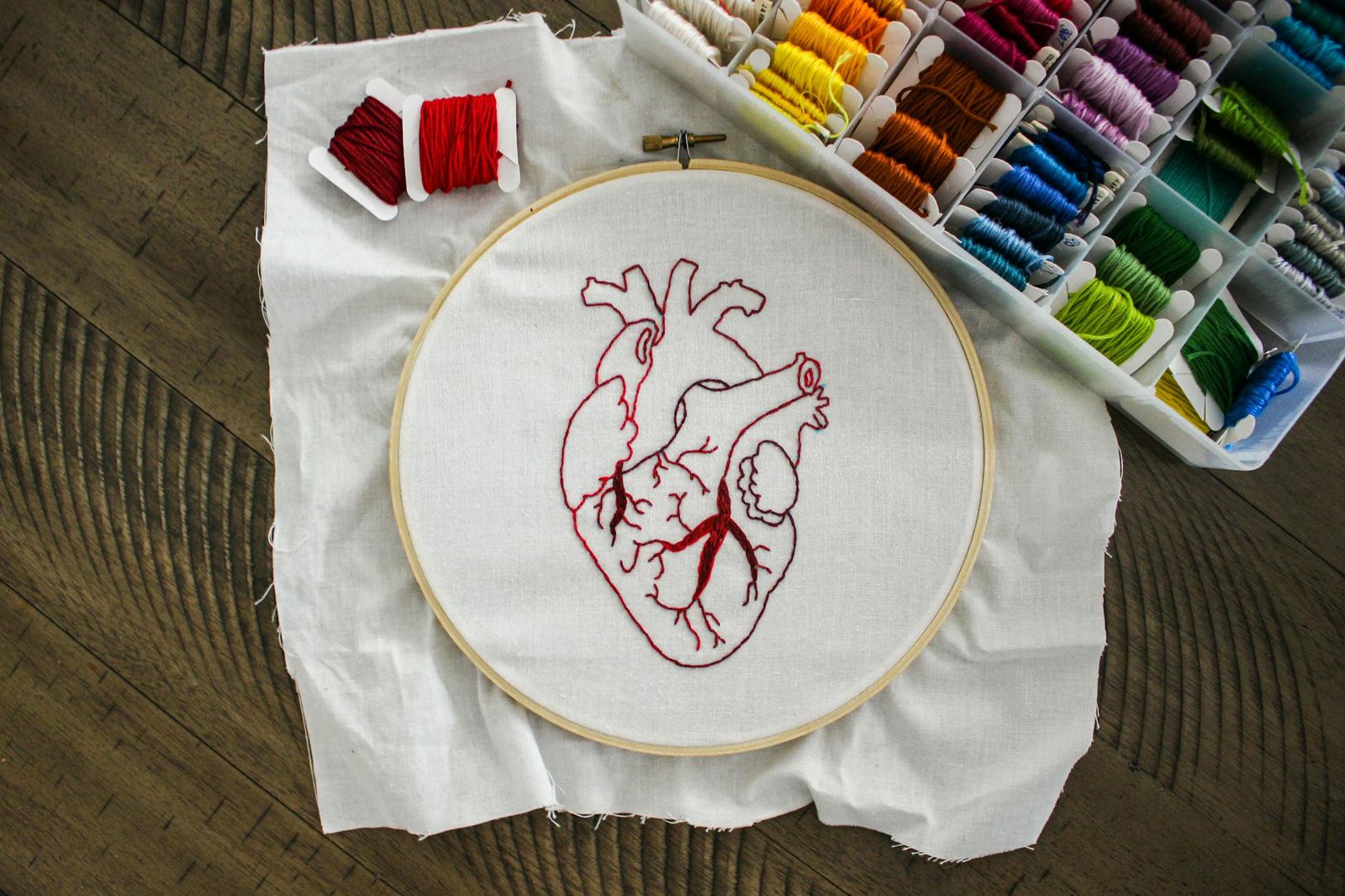Unraveling the Mystery: Genetics and Your Heart Health
Today, we’re diving into the fascinating world of genetics and how they play a role in your heart health. Ever wondered why some people seem to breeze through life without worrying about heart disease while others face challenges? Let’s explore the genetic factors that can influence your heart health journey and what you can do to stack the odds in your favor!
The Building Blocks of You
First things first—let’s talk genes. These tiny bits of DNA inherited from your parents act like a blueprint for your body, determining everything from your eye color to how your heart functions. When it comes to heart disease, genetics can play a significant role in predisposing individuals to conditions like high blood pressure, high cholesterol levels, and heart rhythm disorders. So, understanding your genetic background can provide valuable insights into your risk factors.
Family Matters: The Influence of Genetic Heritage
You’ve probably heard the phrase “it runs in the family,” and when it comes to heart disease, there’s often truth to it. If heart disease, stroke, or other cardiovascular conditions are common among your close relatives—parents, siblings, grandparents—it could indicate a genetic predisposition. This doesn’t mean your fate is sealed, though! Awareness of your family history empowers you to take proactive steps to manage risk factors, such as adopting a heart-healthy lifestyle and regular check-ups with your healthcare provider.
The Role of Genetic Testing: Unlocking Insights
In recent years, advances in genetic testing have opened doors to a deeper understanding of how our genes influence health outcomes. Genetic tests can identify specific genetic variants linked to increased risk of heart disease, providing individuals with personalized information about their susceptibility. Armed with this knowledge, you can work with your healthcare team to tailor preventive measures and interventions that are right for you. It’s like having a roadmap to navigate your heart health journey with greater precision.
Lifestyle Choices: Your Secret Weapon Against Genetic Predispositions
While genetics may load the gun, lifestyle pulls the trigger—or prevents it from firing altogether! Making heart-healthy choices plays a pivotal role in mitigating genetic risks. Regular exercise not only strengthens your heart but also helps manage weight and reduce cholesterol levels. A balanced diet rich in fruits, vegetables, whole grains, and lean proteins supports overall cardiovascular health. Managing stress through relaxation techniques or hobbies can lower blood pressure and improve heart function. And let’s not forget the importance of kicking unhealthy habits like smoking to the curb—your heart will thank you!
Empower Yourself: Taking Charge of Your Heart Health
Knowledge is power, especially when it comes to your heart health. By understanding your genetic predispositions and family history, you can make informed decisions that positively impact your well-being. Schedule regular check-ups with your healthcare provider to monitor blood pressure, cholesterol levels, and other key indicators. Discuss genetic testing options if you have concerns or a significant family history of heart disease. Remember, small changes in your daily routine can add up to significant improvements in your heart health over time.
Support Networks: Building a Heart-Healthy Community
Navigating the complexities of heart health isn’t something you have to do alone. Lean on your support network—family, friends, healthcare professionals—to stay motivated and informed. Share your journey and encourage loved ones to prioritize their heart health too. By fostering a supportive environment, you create a ripple effect of positive change that extends beyond yourself. Together, we can raise awareness, promote heart-healthy lifestyles, and ultimately reduce the impact of genetic factors on heart disease.
Cracking the Code: Familial Predispositions to Heart Attacks

The familial predispositions to heart attacks—what it means, how it affects you, and what steps you can take to safeguard your heart health. Whether heart disease runs in your family or you’re just curious about genetic influences, understanding this topic can empower you to make informed choices for a healthier heart.
What Does “Familial Predisposition” Mean?
Imagine your family as a treasure trove of genetic information. If heart disease, particularly heart attacks, occurs frequently among your close relatives—parents, siblings, grandparents—it suggests a familial predisposition. This doesn’t mean you’re destined to follow the same path, but it does raise awareness about potential genetic factors that could influence your heart health. So, knowing your family history can be like a crystal ball into your future health.
Unveiling the Genetic Influence
Our genes play a significant role in determining how our bodies function, including how susceptible we are to heart disease. Genetic variants can impact cholesterol metabolism, blood pressure regulation, and the integrity of blood vessels, all of which contribute to heart attack risk. If you have a family history of heart attacks, certain genetic factors may increase your likelihood of experiencing one. Understanding this genetic influence allows you to take proactive steps to mitigate risks.
Navigating Risk Factors: Combining Genetics with Lifestyle
While genetics may set the stage, lifestyle choices can either amplify or mitigate your risk of a heart attack. Regular physical activity not only strengthens your heart but also helps maintain healthy cholesterol levels and blood pressure. Eating a balanced diet rich in fruits, vegetables, whole grains, and lean proteins supports heart health by reducing plaque buildup in arteries. Managing stress through relaxation techniques or hobbies can lower blood pressure and promote overall well-being. By combining genetic awareness with a heart-healthy lifestyle, you empower yourself to take control of your heart health destiny.
Early Detection: The Power of Knowledge
Knowledge is your greatest ally in the fight against heart disease. If you have a family history of heart attacks, it’s crucial to stay proactive about monitoring your cardiovascular health. Schedule regular check-ups with your healthcare provider to assess blood pressure, cholesterol levels, and other key indicators. Depending on your family history and risk factors, your doctor may recommend additional tests such as coronary calcium scoring or genetic testing to further evaluate your heart health. Early detection allows for timely intervention and better management of risk factors.
Support Systems: Building a Heart-Healthy Community
Facing the possibility of a familial predisposition to heart attacks can feel overwhelming, but you’re not alone in this journey. Lean on your support network—family, friends, healthcare professionals—to stay motivated and informed. Share your concerns and encourage loved ones to prioritize heart health as well. Together, you can create a supportive environment that promotes healthy habits and regular check-ins with healthcare providers. By advocating for each other’s well-being, you strengthen your collective resolve to beat the odds and live heart-healthy lives.
Empowering Yourself: Taking Charge of Your Heart Health
Ultimately, you have the power to influence your heart health outcomes, regardless of genetic predispositions. Educate yourself about risk factors and make informed decisions about your lifestyle. Quit smoking if you smoke, limit alcohol consumption, and strive for a healthy weight. Stay proactive about managing chronic conditions like diabetes or hypertension, which can significantly impact heart health. Remember, small changes in your daily habits can add up to significant improvements in your overall well-being and longevity.
Unlocking the Secrets: Genetic Testing and Your Heart Health

The intriguing world of genetic testing and how it can shed light on your heart health. Genetic testing isn’t just about ancestry—it can provide valuable insights into your risk of developing heart disease, help tailor preventive strategies, and empower you to take proactive steps for a healthier heart. Let’s explore the implications of genetic testing and what it means for you!
What is Genetic Testing?
Genetic testing is like peeking into your DNA to uncover clues about your health. It involves analyzing your genetic material—your DNA—to identify specific variations or mutations that may predispose you to certain conditions, including heart disease. By understanding these genetic factors, healthcare providers can assess your risk and recommend personalized strategies to keep your heart ticking strong.
The Power of Personalized Medicine
Imagine having a roadmap to your heart health tailored just for you. That’s the promise of genetic testing. By identifying genetic markers associated with increased risk of heart disease, genetic testing allows for early detection and intervention. It helps healthcare providers develop personalized prevention plans that may include lifestyle changes, medications, or more frequent monitoring based on your genetic profile. It’s like having a crystal ball into your future health, guiding you towards better choices.
Who Should Consider Genetic Testing?
Genetic testing for heart disease is particularly beneficial if you have a family history of cardiovascular conditions such as heart attacks, strokes, or high cholesterol. If your relatives have experienced these issues at a young age, genetic testing can provide clarity on whether you carry genetic variants that predispose you to similar risks. Additionally, individuals with certain risk factors like high blood pressure, diabetes, or obesity may also benefit from genetic testing to better understand their overall cardiovascular health.
Understanding Your Results: What Do They Mean?
So, you’ve taken the plunge and gotten your genetic test results back—now what? Your healthcare provider will interpret the results and discuss what they mean for your heart health. They’ll explain whether you have genetic variants associated with increased risk of heart disease and what steps you can take to mitigate those risks. Remember, genetic testing isn’t a crystal ball predicting your future—it’s a tool to empower you with knowledge and guide proactive health decisions.
Navigating Emotional Implications
It’s natural to feel a mix of emotions when exploring your genetic predisposition to heart disease. From curiosity to concern, your feelings are valid. Remember, genetic testing is about empowerment. Armed with knowledge, you can take control of your health journey and implement strategies to reduce your risk factors. Lean on your support network—family, friends, and healthcare professionals—for guidance and encouragement as you navigate this journey toward better heart health.
Cost and Accessibility Considerations
Genetic testing for heart disease has become more accessible in recent years, but it’s essential to consider factors like cost and insurance coverage. Some tests may be covered by insurance if there’s a strong family history of heart disease, while others may require out-of-pocket expenses. Research your options and discuss financial considerations with your healthcare provider to make an informed decision that fits your budget and health goals.
Moving Forward: Integrating Genetic Insights into Your Health Routine
Once you have your genetic test results, it’s time to put them into action. Work closely with your healthcare team to develop a personalized plan that incorporates your genetic insights. This may involve adjusting your diet and exercise routine, starting medications to manage cholesterol or blood pressure, or scheduling regular check-ups to monitor your heart health. By integrating genetic information into your health routine, you empower yourself to make proactive choices that support a healthier future.
Navigating Genetic Risk: Lifestyle Modifications for a Healthier Heart

Let’s talk about lifestyle modifications—simple changes you can make to support your heart health, especially if you have genetic risk factors for cardiovascular conditions. Whether heart disease runs in your family or you’re taking proactive steps based on genetic testing, these tweaks can make a big difference in keeping your heart strong and thriving. Let’s dive in and explore how you can optimize your lifestyle for a healthier heart!
Eat Smart: Fuel Your Heart with Goodness
Your diet plays a crucial role in managing genetic risk factors for heart disease. Focus on a balanced diet rich in fruits, vegetables, whole grains, and lean proteins. Limit saturated fats, trans fats, and cholesterol-heavy foods to help keep your arteries clear and your heart pumping strong. Incorporate heart-healthy fats like those found in nuts, seeds, and olive oil. By choosing nutrient-dense foods, you provide your body with the building blocks it needs to support optimal heart function.
Move More: Exercise Your Heart Muscle
Regular physical activity is a powerful ally in managing genetic risks for heart disease. Aim for at least 150 minutes of moderate-intensity exercise per week, such as brisk walking, swimming, or cycling. Exercise strengthens your heart muscle, improves circulation, and helps maintain healthy blood pressure and cholesterol levels. Find activities you enjoy—whether it’s dancing, gardening, or playing sports—and make them a regular part of your routine. Your heart will thank you for the workout!
Stress Less: Relaxation Techniques for Heart Health
Managing stress is essential when dealing with genetic risk factors for heart disease. Chronic stress can elevate blood pressure and increase inflammation, contributing to cardiovascular problems. Practice relaxation techniques such as deep breathing, meditation, yoga, or tai chi to promote relaxation and reduce stress levels. Engage in hobbies you enjoy, spend time with loved ones, and prioritize activities that bring you joy and peace of mind. A calm mind contributes to a healthy heart—so take a moment to unwind and breathe easy.
Maintain a Healthy Weight: Your Heart’s Best Friend
Maintaining a healthy weight is crucial for managing genetic risk factors for heart disease. Excess weight can strain your heart, increase blood pressure, and worsen cholesterol levels. Aim for a body mass index (BMI) within the healthy range by combining a balanced diet with regular physical activity. Focus on gradual, sustainable weight loss if needed, and celebrate small victories along the way. By achieving and maintaining a healthy weight, you reduce strain on your heart and improve overall cardiovascular health.
Quit Smoking: Kick the Habit for a Healthier Heart
If you smoke, quitting is one of the most impactful changes you can make for your heart health. Smoking damages blood vessels, increases the risk of blood clots, raises blood pressure, and reduces oxygen supply to the heart. Seek support from friends, family, or a cessation program to help you quit for good. Your lungs and heart will begin to heal almost immediately after quitting, lowering your risk of heart disease over time. Take the first step towards a smoke-free future your heart will thank you!
Monitor and Manage: Regular Check-ups Are Key
Regular check-ups with your healthcare provider are essential for managing genetic risk factors for heart disease. Monitor blood pressure, cholesterol levels, blood sugar, and other key indicators regularly. Your doctor may recommend medications to control blood pressure or cholesterol if needed. Stay informed about your health status and discuss any concerns or changes with your healthcare team promptly. By staying proactive and vigilant, you can catch potential issues early and take steps to keep your heart healthy.
Create a Support System: You’re Not Alone
Dealing with genetic risk factors for heart disease can feel overwhelming at times, but you don’t have to face it alone. Lean on your support network—family, friends, and healthcare professionals—for guidance, encouragement, and understanding. Share your goals for heart-healthy living and celebrate your progress together. By surrounding yourself with positivity and support, you strengthen your resolve and commitment to maintaining a healthy heart. Together, you can navigate the journey towards heart health with confidence and optimism.
